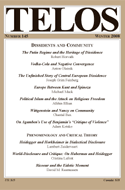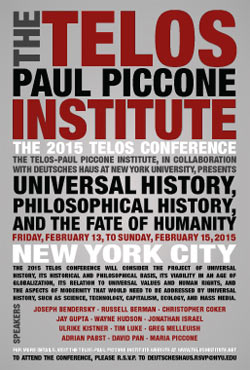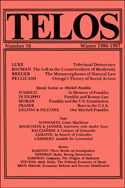By Lewis West · Tuesday, April 21, 2015  In her exploration of Wittgenstein’s elusive and scattered commentary on community, Chantal Bax notes the absence of an explicit understanding of community in the philosopher’s work. Though Wittgenstein often invokes communal concepts, he rarely provides any details regarding the exact nature of a proper community, or the maintenance and governance a just society requires. Bax highlights the one place where Wittgenstein succumbs to the “unfortunate metaphor” of the body politic: he suggests the Jews, marginalized by European society, resemble a “‘kind of disease, anomaly,'” a “‘swelling'” which can “‘only be considered to be a proper part of the body when the whole feeling for the body is changed'” (105). Bax reads this as a tragic and empathetic lament: Wittgenstein doubts the possibility of a renewed, welcoming society that nonetheless adheres to this same vocabulary of the political body. And it is this prophetic doubt that intensifies the crisis of community that reiterates the necessity of Wittgenstein’s rethinking of life together. In her exploration of Wittgenstein’s elusive and scattered commentary on community, Chantal Bax notes the absence of an explicit understanding of community in the philosopher’s work. Though Wittgenstein often invokes communal concepts, he rarely provides any details regarding the exact nature of a proper community, or the maintenance and governance a just society requires. Bax highlights the one place where Wittgenstein succumbs to the “unfortunate metaphor” of the body politic: he suggests the Jews, marginalized by European society, resemble a “‘kind of disease, anomaly,'” a “‘swelling'” which can “‘only be considered to be a proper part of the body when the whole feeling for the body is changed'” (105). Bax reads this as a tragic and empathetic lament: Wittgenstein doubts the possibility of a renewed, welcoming society that nonetheless adheres to this same vocabulary of the political body. And it is this prophetic doubt that intensifies the crisis of community that reiterates the necessity of Wittgenstein’s rethinking of life together.
Continue reading →
By Telos Press · Monday, April 20, 2015 Writing at the Daily Beast, Joel Kotkin examines how the drought in California reflects the broader social and economic transformation of the state—and why current political policies that inhibit growth are to blame. Kotkin is the author The New Class Conflict, published by Telos Press Publishing and available for purchase in our store.
Continue reading →
By David Pan · Thursday, April 9, 2015  The worldwide reaction to the Charlie Hebdo attacks can be seen as a welcome indication of a global consensus concerning freedom of speech, individual rights, and opposition to Islamic fundamentalism. However, left-wing critics such as Noam Chomsky have criticized the worldwide demonstrations against the attacks as hypocritical because they ignore the more serious massacres that have been conducted by Americans with drone strikes and in military activities in Iraq, Serbia, and Syria. As Chomsky writes, “[a]lso ignored in the ‘war against terrorism’ is the most extreme terrorist campaign of modern times—Barack Obama’s global assassination campaign targeting people suspected of perhaps intending to harm us some day, and any unfortunates who happen to be nearby. Other unfortunates are also not lacking, such as the 50 civilians reportedly killed in a U.S.-led bombing raid in Syria in December, which was barely reported.” Such an equation of “their terror” with “our terror” is based on an image of a universal history in which all of mankind lives within a unified natural community and there is a single standard of measure that could be the basis of criminal behavior. We see this same approach in a more moderate form in Jack Miles’s similar exhortation that the proper response to ISIS and Al Qaeda is that “[y]ou are criminals and we send criminals to jail” rather than declaring a “war on radical Islam.” For both Chomsky and Miles, terrorist attacks count as criminal activity and should be equally condemned from the universal viewpoint of a peace-loving humanity. By diminishing the difference between criminal violence and war, they illustrate the basic tenet of a version of universal history—that all humans are linked together into a common set of natural laws and that such laws transcend historical and political differences. Every war in this perspective would be just as senseless and unjustified as any other form of murder. Teju Cole and Slavoj Žižek make a similar move when they indicate that there is something hypocritical about the support for Charlie Hebdo when other massacres, such as the one by Boko Haram in Baga, Nigeria, go unnoticed and unmourned. The worldwide reaction to the Charlie Hebdo attacks can be seen as a welcome indication of a global consensus concerning freedom of speech, individual rights, and opposition to Islamic fundamentalism. However, left-wing critics such as Noam Chomsky have criticized the worldwide demonstrations against the attacks as hypocritical because they ignore the more serious massacres that have been conducted by Americans with drone strikes and in military activities in Iraq, Serbia, and Syria. As Chomsky writes, “[a]lso ignored in the ‘war against terrorism’ is the most extreme terrorist campaign of modern times—Barack Obama’s global assassination campaign targeting people suspected of perhaps intending to harm us some day, and any unfortunates who happen to be nearby. Other unfortunates are also not lacking, such as the 50 civilians reportedly killed in a U.S.-led bombing raid in Syria in December, which was barely reported.” Such an equation of “their terror” with “our terror” is based on an image of a universal history in which all of mankind lives within a unified natural community and there is a single standard of measure that could be the basis of criminal behavior. We see this same approach in a more moderate form in Jack Miles’s similar exhortation that the proper response to ISIS and Al Qaeda is that “[y]ou are criminals and we send criminals to jail” rather than declaring a “war on radical Islam.” For both Chomsky and Miles, terrorist attacks count as criminal activity and should be equally condemned from the universal viewpoint of a peace-loving humanity. By diminishing the difference between criminal violence and war, they illustrate the basic tenet of a version of universal history—that all humans are linked together into a common set of natural laws and that such laws transcend historical and political differences. Every war in this perspective would be just as senseless and unjustified as any other form of murder. Teju Cole and Slavoj Žižek make a similar move when they indicate that there is something hypocritical about the support for Charlie Hebdo when other massacres, such as the one by Boko Haram in Baga, Nigeria, go unnoticed and unmourned.
Continue reading →
By Monika Lemke · Tuesday, April 7, 2015  Premised on the Left’s fundamental inability to dissociate itself from the ideals of the bourgeois revolution, Zygmunt Bauman’s “The Left as the Counter-Culture of Modernity” introduces the notion of reconstituting “the Left as the counter-culture of modernism,” rather than as the “counter-culture of capitalism.” Bauman makes the case for this repositioning because, in his view, there is no historical agent to carry out an anti-capitalist program. However, by continuing to defend and maintain the Left’s core values of individual autonomy and political democracy, Bauman believes that the Left can identify the barriers preventing their realization in the present neoliberal paradigm. Bauman recounts the Left’s courtship with various strategies, namely, the heterodox critique of capitalist practice and professed affinity with the industrial working class, and the recent flirtation with postmodern theory. By examining each as it addresses the present historical paradigm, he emphasizes the need to rehabilitate the values of the Leftist program and search for alternative strategies to realize them. Premised on the Left’s fundamental inability to dissociate itself from the ideals of the bourgeois revolution, Zygmunt Bauman’s “The Left as the Counter-Culture of Modernity” introduces the notion of reconstituting “the Left as the counter-culture of modernism,” rather than as the “counter-culture of capitalism.” Bauman makes the case for this repositioning because, in his view, there is no historical agent to carry out an anti-capitalist program. However, by continuing to defend and maintain the Left’s core values of individual autonomy and political democracy, Bauman believes that the Left can identify the barriers preventing their realization in the present neoliberal paradigm. Bauman recounts the Left’s courtship with various strategies, namely, the heterodox critique of capitalist practice and professed affinity with the industrial working class, and the recent flirtation with postmodern theory. By examining each as it addresses the present historical paradigm, he emphasizes the need to rehabilitate the values of the Leftist program and search for alternative strategies to realize them.
Continue reading →
By Robert Wyllie · Monday, April 6, 2015  Archaeologists have found the oldest known example of complex intergenerational cooperation at Göbekli Tepe in southern Turkey. Thirty miles away, just across the Syrian border, is the latest flashpoint of a complex intergenerational conflict—what President Obama calls the “barbarism” of the Islamic State.[1] What does the world’s oldest civilization have to do with the world’s newest barbarians? Both show the fundamental role of religion in organizing human societies. Viewing civilization as the product of religion bucks a long academic tradition. A consensus holds that human culture is an adaptive response to the environment. Ecological factors shape the economic base of society, molding civilizations in different ways. Thus, in the “Neolithic Revolution” hypothesis of V. Gordon Childe, civilization originated when the global climate warmed some 12,000 years ago, such that human beings could cultivate grains in fertile river valleys (Mesopotamia, Egypt, India, and China). This was the economic base upon which a civilizational superstructure—hierarchies, regimes, and religion itself—was built. Archaeologists have found the oldest known example of complex intergenerational cooperation at Göbekli Tepe in southern Turkey. Thirty miles away, just across the Syrian border, is the latest flashpoint of a complex intergenerational conflict—what President Obama calls the “barbarism” of the Islamic State.[1] What does the world’s oldest civilization have to do with the world’s newest barbarians? Both show the fundamental role of religion in organizing human societies. Viewing civilization as the product of religion bucks a long academic tradition. A consensus holds that human culture is an adaptive response to the environment. Ecological factors shape the economic base of society, molding civilizations in different ways. Thus, in the “Neolithic Revolution” hypothesis of V. Gordon Childe, civilization originated when the global climate warmed some 12,000 years ago, such that human beings could cultivate grains in fertile river valleys (Mesopotamia, Egypt, India, and China). This was the economic base upon which a civilizational superstructure—hierarchies, regimes, and religion itself—was built.
Continue reading →
By Andrew M. Wender · Friday, April 3, 2015  The emerging exhaustion of the Westphalian paradigm of state sovereignty intimates the profoundly contestable and contingent character of modern, Western claims for a universal model of history. Over several centuries, the state has embodied and enforced foundational postulates, such as the pre-eminence of the individual knowing subject, and the imagined divide between religious and secular realms of existence and authority (with the latter sphere effectively internalizing the sacred import of the former). At present, though, the state’s tenuousness, and yet in key instances fierce tenacity, amidst a world of potent transnational forces, portends the urgency for alternative conceptions of the meaning and arrangement of human life. Contemporary Middle Eastern quandaries are especially illustrative of this predicament: for example, the disintegration (as in Iraq, Syria, Libya) or, then again, coercive retrenchment (viz., Egypt) of state formations and nationalist identities; or, to take another sort of instance, the chimerical prospects for coexistence, or even bare existence, among conflicting national communities, as in Israel/Palestine. Are there political paradigms beyond the Westphalian state that could help to integrate plural traditions in pursuit of less exclusionary, and more just, historical possibilities? The emerging exhaustion of the Westphalian paradigm of state sovereignty intimates the profoundly contestable and contingent character of modern, Western claims for a universal model of history. Over several centuries, the state has embodied and enforced foundational postulates, such as the pre-eminence of the individual knowing subject, and the imagined divide between religious and secular realms of existence and authority (with the latter sphere effectively internalizing the sacred import of the former). At present, though, the state’s tenuousness, and yet in key instances fierce tenacity, amidst a world of potent transnational forces, portends the urgency for alternative conceptions of the meaning and arrangement of human life. Contemporary Middle Eastern quandaries are especially illustrative of this predicament: for example, the disintegration (as in Iraq, Syria, Libya) or, then again, coercive retrenchment (viz., Egypt) of state formations and nationalist identities; or, to take another sort of instance, the chimerical prospects for coexistence, or even bare existence, among conflicting national communities, as in Israel/Palestine. Are there political paradigms beyond the Westphalian state that could help to integrate plural traditions in pursuit of less exclusionary, and more just, historical possibilities?
Continue reading →
|
|
 In her exploration of Wittgenstein’s elusive and scattered commentary on community, Chantal Bax notes the absence of an explicit understanding of community in the philosopher’s work. Though Wittgenstein often invokes communal concepts, he rarely provides any details regarding the exact nature of a proper community, or the maintenance and governance a just society requires. Bax highlights the one place where Wittgenstein succumbs to the “unfortunate metaphor” of the body politic: he suggests the Jews, marginalized by European society, resemble a “‘kind of disease, anomaly,'” a “‘swelling'” which can “‘only be considered to be a proper part of the body when the whole feeling for the body is changed'” (105). Bax reads this as a tragic and empathetic lament: Wittgenstein doubts the possibility of a renewed, welcoming society that nonetheless adheres to this same vocabulary of the political body. And it is this prophetic doubt that intensifies the crisis of community that reiterates the necessity of Wittgenstein’s rethinking of life together.
In her exploration of Wittgenstein’s elusive and scattered commentary on community, Chantal Bax notes the absence of an explicit understanding of community in the philosopher’s work. Though Wittgenstein often invokes communal concepts, he rarely provides any details regarding the exact nature of a proper community, or the maintenance and governance a just society requires. Bax highlights the one place where Wittgenstein succumbs to the “unfortunate metaphor” of the body politic: he suggests the Jews, marginalized by European society, resemble a “‘kind of disease, anomaly,'” a “‘swelling'” which can “‘only be considered to be a proper part of the body when the whole feeling for the body is changed'” (105). Bax reads this as a tragic and empathetic lament: Wittgenstein doubts the possibility of a renewed, welcoming society that nonetheless adheres to this same vocabulary of the political body. And it is this prophetic doubt that intensifies the crisis of community that reiterates the necessity of Wittgenstein’s rethinking of life together.  The worldwide reaction to the Charlie Hebdo attacks can be seen as a welcome indication of a global consensus concerning freedom of speech, individual rights, and opposition to Islamic fundamentalism. However, left-wing critics such as Noam Chomsky have criticized the worldwide demonstrations against the attacks as hypocritical because they ignore the more serious massacres that have been conducted by Americans with drone strikes and in military activities in Iraq, Serbia, and Syria.
The worldwide reaction to the Charlie Hebdo attacks can be seen as a welcome indication of a global consensus concerning freedom of speech, individual rights, and opposition to Islamic fundamentalism. However, left-wing critics such as Noam Chomsky have criticized the worldwide demonstrations against the attacks as hypocritical because they ignore the more serious massacres that have been conducted by Americans with drone strikes and in military activities in Iraq, Serbia, and Syria.  Premised on the Left’s fundamental inability to dissociate itself from the ideals of the bourgeois revolution, Zygmunt Bauman’s “The Left as the Counter-Culture of Modernity” introduces the notion of reconstituting “the Left as the counter-culture of modernism,” rather than as the “counter-culture of capitalism.” Bauman makes the case for this repositioning because, in his view, there is no historical agent to carry out an anti-capitalist program. However, by continuing to defend and maintain the Left’s core values of individual autonomy and political democracy, Bauman believes that the Left can identify the barriers preventing their realization in the present neoliberal paradigm. Bauman recounts the Left’s courtship with various strategies, namely, the heterodox critique of capitalist practice and professed affinity with the industrial working class, and the recent flirtation with postmodern theory. By examining each as it addresses the present historical paradigm, he emphasizes the need to rehabilitate the values of the Leftist program and search for alternative strategies to realize them.
Premised on the Left’s fundamental inability to dissociate itself from the ideals of the bourgeois revolution, Zygmunt Bauman’s “The Left as the Counter-Culture of Modernity” introduces the notion of reconstituting “the Left as the counter-culture of modernism,” rather than as the “counter-culture of capitalism.” Bauman makes the case for this repositioning because, in his view, there is no historical agent to carry out an anti-capitalist program. However, by continuing to defend and maintain the Left’s core values of individual autonomy and political democracy, Bauman believes that the Left can identify the barriers preventing their realization in the present neoliberal paradigm. Bauman recounts the Left’s courtship with various strategies, namely, the heterodox critique of capitalist practice and professed affinity with the industrial working class, and the recent flirtation with postmodern theory. By examining each as it addresses the present historical paradigm, he emphasizes the need to rehabilitate the values of the Leftist program and search for alternative strategies to realize them. 

